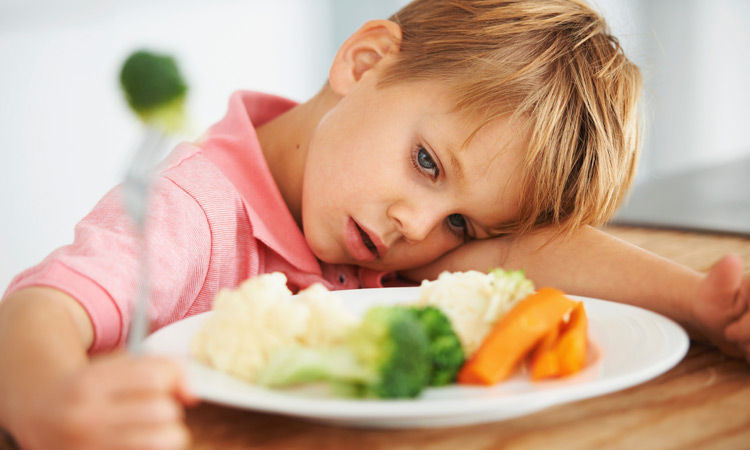
According to research, picky eaters are more likely to suffer from anxiety or depression during childhood. Parents who struggle with picky eaters may panic at this news, but experts offer various techniques to help highly selective eaters.
Picky eating and mental disorders
A study in Pediatrics indicates selective eating is linked to childhood mental disorders. As a highly sensitive person, a child who is a very picky eater is also likely to feel other life experiences more intensely and they may even taste things differently, says Dr. Andrew Desman.
Jenny McGlothlin—a speech pathologist specializing in childhood feeding issues—expressed concerns about the study. She tells Rewire Me, “It’s all based on parent interviews,” which can be unreliable. Also, she emphasized the results demonstrate “a correlation and not a causation” between picky eating and mental disorders.
However, for picky eaters, McGlothlin says, “Absolutely, there is more anxiety, more social anxiety, more conflict at the table.”
But she poses an alternative explanation: “Is the social anxiety about the food? Food is everywhere we go. When apprehension about being pressured to eat specific food kicks in, it may look like generalized anxiety.”
“Parents say kids are so anxious about birthday parties, or going to someone’s house.” Pressure doesn’t come only from the parents, McGlothlin says, but from relatives, neighbors, peers. “But if kids are reassured they don’t have to eat the food, they may feel less anxious. When we take away food anxiety the social anxiety goes away, for many.”
Sensory challenges
Extremely over-responsive children may fixate on a few foods of an acceptable texture. Some experts believe this could be related to a sensory processing disorder, affecting the way the brain interprets information.
McGlothlin agrees many picky eaters have more heightened senses or tastes. Some desire only crunchy foods, or savory and spicy, or want only similar foods or foods with a particular appearance.
But she warns of a typical, developmental stage around 18 months of age: food neophobia, “fear of new food.” Thus, parents should not be surprised if toddlers reject previously enjoyed foods. What counts is how parents reintroduce them later.
“Some kids are sensory seekers,” explorers of different tastes, McGlothlin says, “versus others who ‘eat to live.’ They just don’t care.”
“When parents don’t have the same food temperament as their child, this can be very challenging,” she says. “Often kids are already anxious about the food on the table because they’re pressured to eat it, so they don’t want to go the table.”
How to help picky eaters
 McGlothlin and her colleague, Katja Rowell MD, follow different guidelines. They often work with the parents first, encouraging them to read their book, Helping Your Child with Extreme Picky Eating: A Step-by-Step Guide for Overcoming Selective Eating, Food Aversion, and Feeding Disorders, follow its Steps Plus plan and then talk about whether the child needs therapy.
McGlothlin and her colleague, Katja Rowell MD, follow different guidelines. They often work with the parents first, encouraging them to read their book, Helping Your Child with Extreme Picky Eating: A Step-by-Step Guide for Overcoming Selective Eating, Food Aversion, and Feeding Disorders, follow its Steps Plus plan and then talk about whether the child needs therapy.
McGlothlin only advocates immediate therapy for children with fairly significant sensory or oral motor deficiencies, such as difficulty processing food in the mouth, moving the tongue or inability to chew.
Steps Plus focuses on the child enjoying the meal, wanting to come to the table and eliminating the pressure—which destroys the appetite and makes meal times uncomfortable for everyone.
The number one tip for success is family-style meals where children serve themselves. The key is to have enough “safe foods”—foods kids like, for them to fill up. Then, other family members model positive nutrition. Hopefully, kids will eventually become interested in the foods passed around the table.
“Lots of these kids are temperamental, strong-willed, very intelligent and have their own agenda. Eating is a very personal experience, and it can really interfere with your relationship with your child,” says McGlothlin.
According to dieticians she has consulted, what kids eat is less important, because multi-vitamins can fill those gaps. Fruits give about the same nutrients as vegetables, and protein comes from hidden sources like milk and peanut butter.
“Nutrition is a long term goal,” McGlothlin says. “You have to work on your child’s relationship with food and you—creating a relationship for a lifetime with food.”
Picky eating is a challenge for both children and their parents. While the connection between mental disorders and picky eating remains unclear, many experts in the field agree that forcing children to eat certain foods isn’t the best solution.


